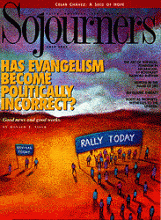It no longer seems in question that our national survival depends in part upon our collective ability to cross racial and ethnic boundaries. To honor diversity is a challenge that is increasingly on the minds, lips, and agendas of the church--and one that often seems, ironically, most difficult for those who share common ground as people of faith and members of the same gender, or those committed to peace and justice.
For some, the attempt to honor the traditions of others can lead not to respect but to exploitation. Members of the dominant culture--in most cases white Christians--are faced with the very real danger of co-opting the symbols of others as they seek to share the richness of different faith traditions.
The genuinely compelling experience of Native American ritual or African-American gospel can leave European Americans wanting more. The grace and strength and dignity in these traditions, born and nurtured out of suffering and filled with joy, celebration, and a bountiful appreciation of life, are often seen as mysterious and wonderful to outsiders.
But how much realistically and respectfully can be shared? Those who seek honestly to honor the heritage and culture of others must consider this question and look at how the desire even to participate genuinely in the traditions of others can and has become a source of oppression.
Marie Therese Archambault, O.S.F., a member of the Hunkpapa tribe of North Dakota, acknowledged the need of Native peoples to rediscover their own spirituality--and to claim the space they need to do so. "I've had experiences recently in finding myself at a very deep level through rituals," she said. "And I thought, 'Maybe I shouldn't tell [those who are not Native Americans], because if I do they'll all want to come.'"
Read the Full Article

